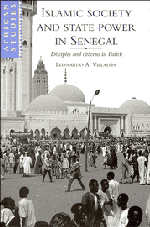Book contents
- Frontmatter
- Contents
- List of tables
- Acknowledgments
- A note on spelling
- Glossary
- Map of Senegal
- Introduction: good Africans, good citizens, good Muslims
- 1 Islam in the politics of state–society relations
- 2 The structure of society: Fatick in the Senegalese context
- 3 The state–citizen relationship: struggle over bridges
- 4 The marabout–disciple relationship I: foundations of recruiting and following
- 5 The marabout–disciple relationship II: the structures of allegiance
- 6 The state–marabout relationship: collaboration, conflict, and alternatives
- 7 Bureaucrats, marabouts, and citizen–disciples: how precarious a balance?
- Notes
- Select bibliography
- Index
- Titles in the series
2 - The structure of society: Fatick in the Senegalese context
Published online by Cambridge University Press: 10 November 2009
- Frontmatter
- Contents
- List of tables
- Acknowledgments
- A note on spelling
- Glossary
- Map of Senegal
- Introduction: good Africans, good citizens, good Muslims
- 1 Islam in the politics of state–society relations
- 2 The structure of society: Fatick in the Senegalese context
- 3 The state–citizen relationship: struggle over bridges
- 4 The marabout–disciple relationship I: foundations of recruiting and following
- 5 The marabout–disciple relationship II: the structures of allegiance
- 6 The state–marabout relationship: collaboration, conflict, and alternatives
- 7 Bureaucrats, marabouts, and citizen–disciples: how precarious a balance?
- Notes
- Select bibliography
- Index
- Titles in the series
Summary
Poverty and a legacy of economic decline
Much of the physical presence of the state in Fatick is housed in the remnants of colonial-era optimism and ambition. The tribunal, the préfecture, and other essential components of local government now occupy the buildings that were once the commercial outposts of French maisons de commerce and the more successful of the Lebanese traders and middlemen. This transition in the occupants of the more durable – if today somewhat decrepit – architectural structures in the town reflects symbolically the historical development of its significance. While the original impetus for Fatick's transformation from a Serer village to a small but heterogeneous urban center was provided by the logic of colonial commercial expansion, the town's brief prosperity evaporated with the demise of the colonial economy. Today it is only the presence of the state that justifies Fatick's appearance on maps of Senegalese cities and towns.
Its proximity to the areas of expanding peanut cultivation and its location on the Sine river near the opening into the Saloum estuary placed Fatick in a good position to capitalize on the emerging colonial economy of the second half of the nineteenth century. References to the town in Martin Klein's seminal history of Sine-Saloum during the period of implantation and consolidation of French colonial rule document this rise in its importance. When a French gunboat first dropped anchor at Fatick in March 1849 in pursuit of a trade agreement with the Buur-Siin, or King of Sine, it was a simple “village on the Sine river that was becoming commercially important.”
- Type
- Chapter
- Information
- Islamic Society and State Power in SenegalDisciples and Citizens in Fatick, pp. 39 - 75Publisher: Cambridge University PressPrint publication year: 1995

